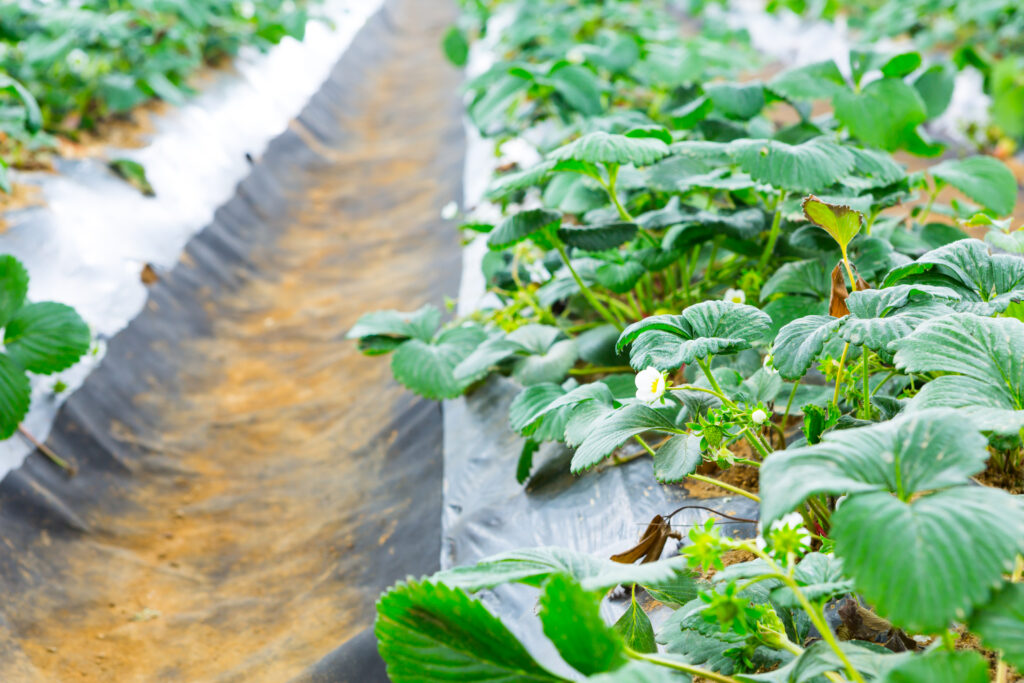In today’s ever-evolving world of agriculture, farmers are constantly seeking new techniques to enhance crop production. One such technique that has gained widespread popularity is the use of plastic mulch. Plastic mulch is a thin layer of plastic sheeting that is spread over the soil, offering a myriad of benefits for farmers. This article aims to delve into the advantages of plastic mulch in modern farming practices and shed light on how it can revolutionise crop cultivation.
What Is Plastic Mulch and How Does It Work?
Plastic mulch is a durable and flexible material made from polyethylene, a type of plastic. It is available in various colours, such as black, white, and transparent, each serving a specific purpose in agriculture. The primary function of it is to create a protective barrier between the soil and the external environment. By covering the soil surface, it helps regulate temperature, conserve moisture, control weed growth, and prevent soil erosion.
Plastic mulch works by trapping heat from the sun, raising the soil temperature. This increased warmth accelerates seed germination and plant growth, especially in cooler climates or early spring planting. Additionally, by blocking sunlight, plastic mulch suppresses the growth of invasive weeds, reducing competition for nutrients and water. The impermeable nature of it also prevents water loss through evaporation, ensuring that the soil remains adequately hydrated.
Types of Plastic Mulch for Different Farming Needs
Plastic mulch comes in a variety of types to cater to the diverse needs of different crops and farming practices. One popular type is agricultural plastic mulch, which is designed specifically for large-scale farming operations. It is available in widths of up to 6 feet, allowing for efficient application using specialised machinery. This type of mulch is known for its durability, longevity, and ability to withstand harsh weather conditions.
For smaller-scale gardening, plastic garden mulch is the ideal choice. It is available in narrower widths and is easily applied by hand. This type of plastic mulch is lightweight, making it convenient for home gardeners who want to maximise their crop yields without investing in heavy machinery. Plastic garden mulch also comes in various colours, enabling gardeners to choose the best option for their specific crops and soil conditions.
Benefits of Mulching in Agriculture
The advantages of using plastic mulch in agriculture extend far beyond the surface. Firstly, it acts as an insulator, regulating soil temperature and protecting crops from extreme weather conditions. In colder regions, it helps retain heat, promoting early planting and extending the growing season. Conversely, in hot climates, it prevents overheating of the soil, ensuring optimal conditions for crop growth.
Secondly, this type of mulch significantly reduces weed growth, minimising the need for herbicides and manual labour. By preventing sunlight from reaching the soil, it inhibits weed seed germination and stunts the growth of existing weeds. This not only saves farmers valuable time but also reduces the competition for nutrients, water, and sunlight, allowing crops to thrive.
Thirdly, plastic mulch conserves moisture by reducing evaporation from the soil surface. This is particularly beneficial in arid regions or during dry spells when water resources are scarce. By locking in moisture, the mulch ensures that crops receive a consistent water supply, leading to healthier plants, increased yields, and enhanced overall crop quality.
The Role of Plastic Mulching Sheets In Crop Production
Plastic mulching sheets play a crucial role in crop production, enabling farmers to optimise their yield and quality. These sheets are placed directly on the soil surface, covering the planting beds or rows. They act as a physical barrier, preventing soil compaction and maintaining a loose, well-aerated soil structure, vital for healthy root growth.
Furthermore, these mulching sheets create a microclimate that is favourable for crops. By trapping heat, they warm the soil, stimulating root development and accelerating plant growth. This is particularly beneficial for heat-loving crops, such as tomatoes, peppers, and melons, which thrive in warmer soil conditions. Mulching sheets also protect crops from excess moisture, preventing waterlogging and reducing the risk of root diseases.
Additionally, these sheets act as a shield against pests and diseases. By covering the soil, they create a physical barrier that deters crawling insects and prevents soil-borne pathogens from splashing onto the plants during heavy rainfall. This reduces the need for chemical pesticides and safeguards the health of crops, promoting organic farming practices.
How To Effectively Use Plastic Mulch In Your Garden
To effectively utilise plastic mulch in your garden, proper installation and maintenance are key. Begin by preparing the soil, ensuring it is free from weeds, rocks, and debris. Smooth out any uneven surfaces and create planting beds or rows, depending on your crop requirements. Lay the plastic mulch carefully over the soil, ensuring it is taut and free from wrinkles or folds.
Secure the edges of the mulch with soil, rocks, or metal pins to prevent it from shifting or blowing away. Make small slits or holes in the plastic to accommodate your plants, spacing them according to their recommended distances. Gently press the mulch around the base of each plant to create a snug fit, sealing it against the soil surface.
Regularly monitor the moisture levels in the soil and adjust irrigation accordingly. Mulching reduces water loss through evaporation, so it is essential to provide sufficient hydration to your plants. Additionally, periodically inspect the mulch for tears or damage, repairing or replacing it as needed to ensure its effectiveness in weed control and temperature regulation.
The Importance of A Plastic Mulch Layer In Commercial Farming
In the realm of commercial farming, plastic mulch plays an integral role in maximising productivity and profitability. The use of mulch allows farmers to achieve higher crop yields, reduce production costs, and optimise land utilisation. By employing precise planting techniques and irrigation systems, farmers can efficiently manage their resources while minimising waste.
The plastic mulch layer provides an ideal environment for precision planting, particularly when used in conjunction with drip irrigation systems. Precise placement of seeds or transplants through small holes in the plastic ensures optimal plant spacing and uniform growth. This precise control over planting density allows for efficient use of fertilisers, water, and other inputs, resulting in higher yields a nd reduced wastage.
Furthermore, the use of plastic mulch in commercial farming enables farmers to extend their growing season and diversify their crop offerings. By manipulating the soil temperature and moisture levels, farmers can cultivate crops that are typically grown in different seasons or climates. This allows for a more consistent supply of produce throughout the year, meeting market demands and increasing profitability.
Exploring The Benefits of Mulching in Crop Cultivation
Black plastic mulch is a popular choice among farmers due to its unique benefits for crop cultivation. The black colour absorbs and retains more heat from the sun compared to other colours, creating a warmer microclimate in the soil. This is particularly advantageous for crops that require higher soil temperatures, such as melons, eggplants, and sweet potatoes.
Additionally, black plastic mulch acts as an effective weed suppressant. The absence of light beneath the black plastic inhibits weed growth, reducing the need for herbicides and manual labour. This is especially beneficial for organic farmers who prioritise sustainable and environmentally-friendly practices in their operations.
Moreover, it enhances soil moisture retention. By reducing evaporation, it helps conserve water and ensures that crops have a consistent supply of moisture. This is particularly valuable in regions with limited water resources or during dry spells when irrigation may be scarce.
Polyethylene Plastic Mulch: Advantages and Applications
Polyethylene plastic mulch is a versatile and widely-used material in modern agriculture. It offers numerous advantages over other types of plastic mulch, making it a popular choice among farmers. Firstly, polyethylene plastic mulch is highly durable and long-lasting, with the ability to withstand extreme weather conditions and resist degradation from ultraviolet (UV) radiation.
Furthermore, it is available in various thicknesses, allowing farmers to choose the most suitable option for their specific needs. Thicker mulch provides better weed control and moisture retention, while thinner mulch allows for easier seedling emergence. This versatility makes this type of mulch adaptable to different crops, climates, and farming practices.
Polyethylene plastic mulch is also recyclable, contributing to sustainable agriculture practices. After use, it can be collected, cleaned, and processed into new mulch or other plastic products. This reduces waste and minimises the environmental impact associated with plastic use in agriculture.
Key Takeaway
In conclusion, plastic mulch has emerged as a game-changer in modern farming practices, offering a multitude of hidden benefits. From regulating soil temperature to conserving moisture, controlling weeds, and protecting crops from pests and diseases, plastic mulch has revolutionised crop cultivation. Its versatility, cost-effectiveness, and ability to enhance productivity make it an indispensable tool for both small-scale gardeners and commercial farmers alike.

